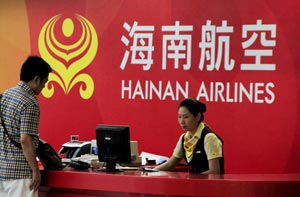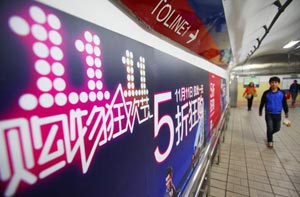
Chinese online retailers' revenue figures outstrip US market's on Cyber Monday
The sales revenue a few Chinese online retailers made this Nov 11 - a date set aside in China in honor of single people - was more than double the entire amount made in the US market last year on so-called Cyber Monday, or the day following Thanksgiving weekend.
Analysts said online retailers offered various promotions for Singles' Day, which fell on Sunday this year, helping to stimulate domestic consumption.
The biggest online shopping sites in China, Taobao.com and Tmall.com, both of which are owned by the e-commerce giant Alibaba Group Holding Ltd, had 19.1 billion yuan ($3.06 billion) in total transactions on Sunday. That company's lead was followed by other Chinese e-commerce websites, many of which had also offered discounts to give their sales a boost that day but hadn't released revenue figures for the day by press time.
Alibaba's sales alone were more than double the $1.25 billion that retailers made through online sales in the US market on Cyber Monday last year, according to the research company comScore.
One contributor to Sunday's spending binge, which generated about as much revenue as three weeks' worth of retail sales in Hong Kong, was an explosion in shopping among those who are usually reluctant to buy relatively higher-priced goods, said Ding Ningning, a researcher at the State Council's Development Research Center.
"It's not that consumers can't afford to buy things," he said. "It's that prices are sometimes too high, (which affects people's willingness to buy)."
Singles' Day was started by university students and later taken up by e-commerce companies as an opportune time to offer sales promotions.
Ding said the promotions offered on that day often reduce the prices of goods by half. Those help encourage people, especially young Internet users who are often less inclined to plump for relatively expensive items, to make purchases online.
In an interview with China Central Television, Jack Ma, chairman and chief executive officer of Alibaba, said the online shopping figures are "a signal that China's economy is making a transition".
China has been trying to stimulate domestic consumption to boost its growth at a time that the weak global economy continues to put a damper on exports from China. The country's economy grew at a rate of 7.4 percent in the third quarter, its lowest quarterly rate in more than three years.
Xu Wei, a researcher from the China Center for International Economic Exchanges, agreed that online shopping is becoming an ever-more popular way to increase the spending power of Chinese consumers.
Even so, she said the Singles' Day promotions might have merely caused certain products, such as cars, to be sold sooner than they would have otherwise and could ultimately lead to declines in future demand. An automobile shop on Tmall sold more than 300 cars on Sunday, said Alibaba.
During the Nov 11 promotion, 217 online vendors that were then trading on Tmall.com - nearly quadruple the number for last year - had more than 10 million yuan in total sales, said Alibaba.
The clothes brand Jack & Jones topped the list, having 119 million yuan worth of sales, about three times the amount it had during the promotion last year.
E-Commerce China Dangdang Inc, a US-listed online retailer, had 100 million yuan in sales on Monday. And Tencent Holdings Ltd's 51buy.com said its sales exceeded 120 million yuan on Sunday, more than 10 times the amount on the same date a year before.
Most of the other e-commerce companies that provided discounts on Nov 11, including Jingdong Mall and Amazon China, hadn't disclosed their sales figures by press time.
E-commerce, which has become increasingly popular in recent years, is expected to see its value increase to 18 trillion yuan by 2015, four times the amount for 2010.
By that time, it is predicted to be the source of 9 percent of all retail sales in China, according to the 12th Five-Year Plan (2011-15).
Online shopping generated only 4.32 percent of retail sales last year, up from 1.16 percent in 2008.
 Sichuan becoming traffic hub of W China
Sichuan becoming traffic hub of W China
 Mandarin festival attracts tourists
Mandarin festival attracts tourists
 Dawn of China's foreign trade recovery
Dawn of China's foreign trade recovery
 October export growth accelerates, imports steady
October export growth accelerates, imports steady
 Hainan Airlines eyes more overseas investment
Hainan Airlines eyes more overseas investment
 Views and hopes from top executives
Views and hopes from top executives
 E-retailers brace for massive promotion for Nov 11 event
E-retailers brace for massive promotion for Nov 11 event
 Those who deliver warmth in winter
Those who deliver warmth in winter

